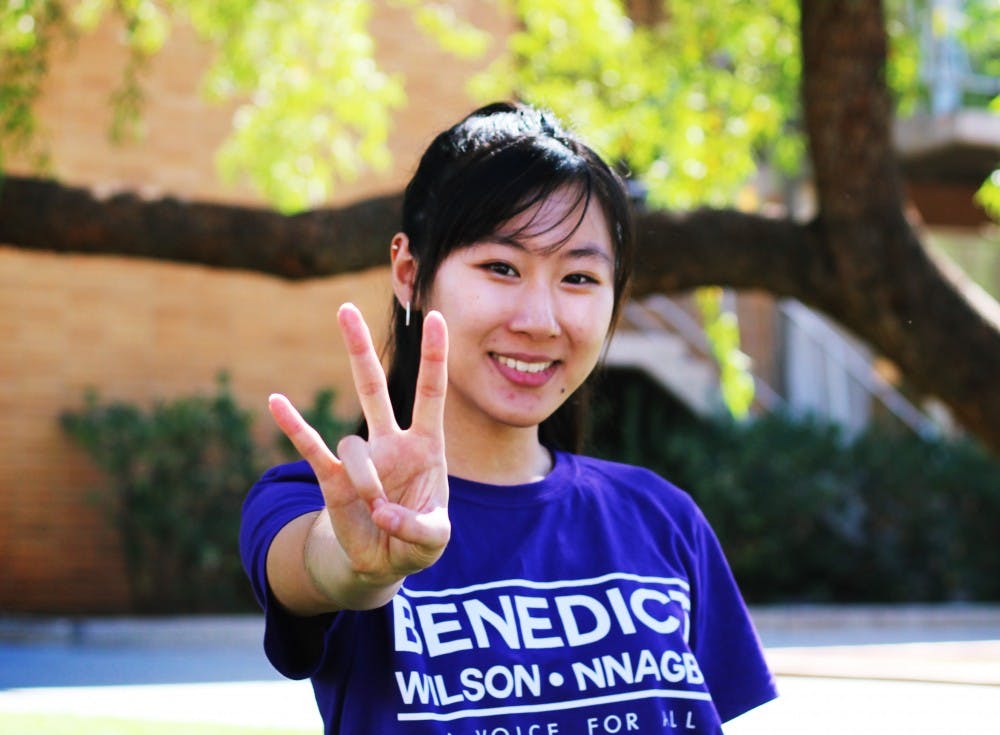April brings Asian Pacific American Heritage Month to ASU, celebrating Asian and Pacific Islander students in the United States and the different cultures they embrace.
In 1992, Congress officially designated May as Asian/Asian Pacific American Heritage month as a way to remember the immigration of the first Japanese to the United States on May 7, 1843, and to also mark the completion of the transcontinental railroad, which many Chinese immigrants worked on, according to an Asian Pacific Heritage government site.
Although the month of May is nationally known as Asian American and Pacific Islander Heritage Month (APAHM), ASU celebrates Asian Pacific Heritage Month in April and elicits support from multicultural member organizations on campus.
Emily Kwon, a senior biological sciences major and president of the Asian/Asian Pacific American Students' Coalition (AAPASC), a collaborative group of 12 organizations that emphasize Asian awareness at ASU, said this month is a celebration that showcases students and their backgrounds.
“It really is a month of showcasing all of us, not just AAPASC, but all Asian Pacific Americans, all their cultures, their struggles and their life stories,” she said. “This is our platform month where we can really shout out our message.”
Kwon said this month also raises awareness for the stereotypes Asian and Asian Pacific students may face.
“It’s eye-opening and reaffirming at the same time, we all kind of share the same experiences of racial discrimination, stereotyping and microaggressions,” she said. “Once you realize a whole community goes through this every single day, it really opens your eyes to the issues that modern American society is still having.”
Kwon said AAPASC encourages these organizations to showcase their traditions and talk about difficult problems involving race.
“Racism and discrimination are very hard topics to talk about because people don’t want to be on the wrong side,” she said. “It not about good or bad, it’s about having that understanding, and If we keep them in the dark, nothing will be solved.”
Kwon said she has experienced these assumptions and labels in her own life.
“Personally, as an Asian-American woman, there was a lot of fetishizing of Asian women,” she said. “People always assume that I’m very meek, obedient and quiet, and they don’t give you that chance to really express who you actually are in the inside.”
However, Kwon said she now takes great pride in her heritage.
“When I came here and I met these amazing people they really showed me that it’s okay to be proud of your heritage, and they helped me become more confident with myself, cultivate my leadership skills and help me understand that it’s okay to stand up for yourself,” she said.
Kevin Ho, a sophomore business and entrepreneurship major and vice president of AAPASC, said this month allows multicultural organizations to share their traditions with everyone.
“It’s a demonstration of the capabilities that we have as a campus entity and sort of demonstrating that we have a presence at ASU,” he said. “It’s a very fun and interactive way for people who don’t necessarily know too much about our culture to really connect with it.”
Ho said people are often surprised by the more modern, non-traditional parts of the culture.
“The whole point of the events is to demonstrate that we can be our traditional culture, but at the same time we can be all these other personalities and characteristics with different talents,” he said. “While there is that aspect, we still want to demonstrate that a lot of us are very urban or modern.”
Rea Angela Plotado, a senior biology major with a focus in neurology and vice president of Hawai’i Pacific Islander Club (HPIC), said the celebration of multicultural organizations makes her feel at home, despite how different Arizona is from her country of origin.
“To me this month is very important because I’m from the Philippines and then coming to Hawaii I learned so many different cultures in a span of five years,” she said. “I found my family through this club.”
Plotado said HPIC is promoting heritage month by hosting a luau with food local to the islands.
"When (people) think of Pacific Islanders, they think of Hawaii, but it’s more than just that,” she said. “I feel like some people don’t really know what it’s about, so they want to distance themselves from it, but I feel like the best thing that you can do is face your fears and be open-minded.”
Plotado said people could learn new things about her culture by attending events and watching their traditional dances.
“A lot of people believe that hula is mainly for girls, but the first people to dance hula was actually men.”
Plotado said Asian/Asian Pacific American Heritage Month helps remind people of where they came from.
“A lot of students actually go back home to their island just because they don’t feel the sense of community as they did back home,” she said. “Coming to Arizona is a huge culture change.”
Reach the reporter at kasando1@asu.edu or follow @karismasandoval onTwitter.
Like The State Press on Facebook and follow @statepress on Twitter.




